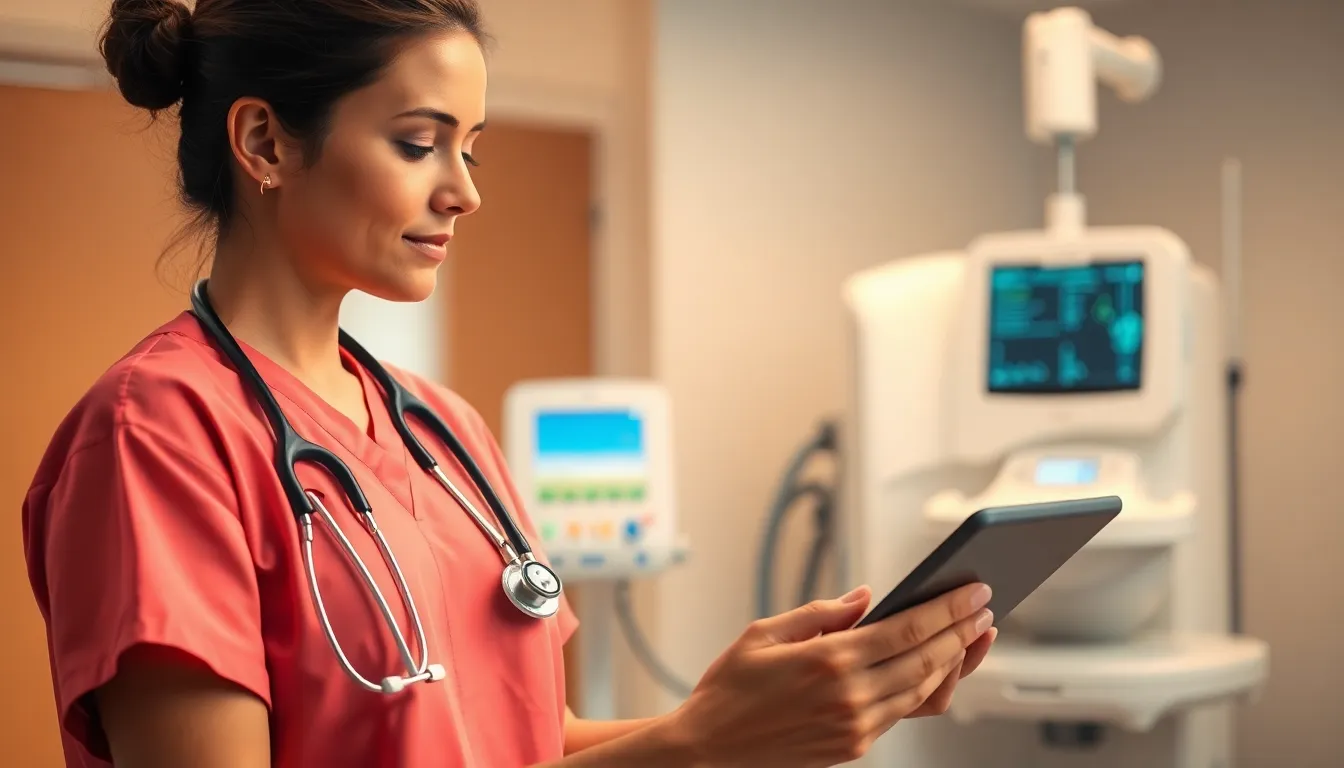Table of Contents
ToggleIn a world where science meets compassion, biotech nursing is the superhero of healthcare. Imagine a nurse equipped with the latest tech gadgets, not just a stethoscope but also a toolkit of biotechnological wonders. They’re not just bandaging boo-boos; they’re on the front lines of innovation, helping patients navigate the complex landscape of genetic therapies and advanced treatments.
With the power of biotechnology, these nurses are transforming patient care into something out of a sci-fi movie. They blend empathy with cutting-edge science, ensuring patients receive the best possible outcomes while making the process feel less like a trip to the doctor and more like a journey into the future. If you think nursing is just about giving shots and checking blood pressure, think again! Biotech nursing is where the magic happens, and it’s time to dive into this fascinating field.
What Is Biotech Nursing?
Biotech nursing represents a significant evolution in patient care. This field blends nursing practices with advanced biotechnology, emphasizing the integration of cutting-edge treatments and innovative technologies. Biotech nurses leverage tools such as genetic testing and personalized medicine to create tailored care plans for patients.
In addition to technical skills, soft skills remain essential. Empathy plays a crucial role in helping patients navigate complex treatment processes. By fostering strong relationships, biotech nurses ensure patients feel supported throughout their healthcare journey.
Specific responsibilities include monitoring patient reactions to new therapies and educating them about intricate procedures. Biotech nurses often collaborate with interdisciplinary teams, enhancing overall patient outcomes. Their critical thinking abilities allow them to adapt care routines based on emerging research and technology advancements.
This specialization also requires ongoing education to stay current with rapid advancements in biotechnology. Continuous learning ensures that biotech nurses remain proficient in their field, ultimately leading to improved patient care. As a dynamic and ever-evolving profession, biotech nursing reshapes traditional nursing roles in exciting ways.
By integrating science and compassion, biotech nurses offer a unique approach to modern healthcare, truly making a difference in patients’ lives.
The Role of Biotech Nurses

Biotech nurses play a pivotal role in integrating advanced technology into everyday patient care. Their expertise bridges the gap between innovative treatments and compassionate healthcare.
Responsibilities and Duties
Monitoring patient reactions to therapies requires keen observation skills. Educating patients about complex procedures and treatments is essential for informed decision-making. Collaborating with healthcare teams enhances the effectiveness of care plans. Developing personalized care plans based on genetic information allows for tailored treatment approaches. Conducting health assessments ensures accurate tracking of patient progress. Advocating for patient needs fosters strong relationships built on trust.
Skills Required
Strong analytical skills enable biotech nurses to interpret data from genetic tests and other advanced technologies. Effective communication skills are vital for explaining complicated medical concepts in understandable terms. Empathy remains crucial for building rapport with patients during challenging times. Familiarity with biotechnology and medical devices supports efficient use of the latest tools. Problem-solving abilities help in addressing unexpected patient reactions and treatment challenges. Continuous learning keeps nurses informed about the latest advancements in biotechnology and healthcare practices.
Impact of Biotechnology on Nursing
Biotechnology significantly affects nursing practices, enhancing care quality through innovation. Nurses use advanced technologies to improve patient outcomes, streamline treatments, and ensure personalized care.
Advancements in Patient Care
Advances in genetic testing enable targeted therapies that lead to effective treatment plans. Biotech nurses assess individual genetic profiles, tailoring medications and interventions. Innovative drug delivery systems simplify administration, promoting better adherence among patients. Emerging technologies, such as wearable health devices, allow real-time monitoring of patient health. Real-time data collection helps nurses identify issues early, fostering prompt interventions for improved results.
Ethical Considerations
Ethical implications arise with biotechnology in nursing. Patients face privacy concerns regarding sensitive genetic information. Biotech nurses advocate for transparency, ensuring that patients understand the use of their data. Informed consent becomes crucial as complex treatments evolve. Nurses must be aware of potential disparities in access to advanced therapies, striving for equitable healthcare. Balancing scientific advancements with ethical responsibilities shapes the future of biotech nursing.
Education and Training for Biotech Nursing
Biotech nursing requires specific education and training to adapt to its innovative landscape. Programs focus on blending nursing with the latest advancements in biotechnology.
Degree Programs and Certifications
Many aspiring biotech nurses pursue a Bachelor of Science in Nursing (BSN). This degree provides a foundation in nursing principles alongside scientific knowledge. Master’s degrees or specialized certifications often enhance career prospects. Certification programs in biotechnology nursing or clinical research offer additional credentials. Recognized organizations like the American Nurses Credentialing Center provide certification pathways for nurses wanting to specialize in biotechnology.
Continuing Education Opportunities
Biotech nurses engage in ongoing education to stay updated with technological advances. Workshops, webinars, and conferences focus on emerging biotech innovations and practices. Many institutions offer specialized courses in genetic counseling or precision medicine. Professional organizations provide resources and networking opportunities to support career growth. Additionally, nurses can obtain continuing education units (CEUs) for state licensure requirements through these programs. Adapting to changes reinforces their commitment to quality patient care.
Future Trends in Biotech Nursing
Advancements in biotechnology promise to reshape nursing practices significantly. Precision medicine emerges as a key trend, where treatments become tailored to individuals based on genetic, environmental, and lifestyle factors. Increased use of artificial intelligence tools enhances the ability of biotech nurses to analyze patient data more efficiently.
Telehealth technology continues to expand, allowing biotech nurses to monitor patients remotely. This shift increases access to care, particularly for those in underserved areas. Data analytics play a pivotal role, enabling nursing professionals to interpret vast amounts of health information for better-informed decision-making.
Emerging fields such as gene editing and regenerative medicine hold transformative potential for patient care. Nurses equipped with knowledge in these areas can help guide patients through novel therapies. Interdisciplinary collaboration will likely strengthen, promoting improved outcomes through shared expertise.
Continued emphasis on patient education and empowerment is apparent in biotech nursing. As healthcare becomes more complex, nurses will advocate for patients, ensuring they comprehend treatment options. Ethical considerations regarding genetic information privacy will remain a priority as biotech nurses navigate these conversations with sensitivity and transparency.
Enhancements in wearable technology provide real-time health monitoring solutions, fostering proactive management of chronic conditions. These innovations enhance patient engagement, encouraging individuals to take charge of their health. Ongoing education will be essential for biotech nurses, equipping them with the skills to leverage these advancements while maintaining high-quality care standards.
Advancing skills in telecommunication and digital health tools will also be crucial. As healthcare evolves, biotech nurses who adapt to these changes will play integral roles in patient advocacy and care delivery. The future of biotech nursing hinges on the ability to integrate cutting-edge technology with compassionate patient interactions.
Biotech nursing is shaping the future of healthcare by merging advanced technology with compassionate patient care. As biotech nurses continue to adapt to rapid advancements in biotechnology they play a vital role in enhancing patient outcomes and ensuring personalized treatment experiences. Their expertise in areas like genetic testing and telehealth equips them to navigate the complexities of modern medicine.
The ongoing commitment to education and ethical practices ensures that biotech nursing remains at the forefront of healthcare innovation. By fostering strong relationships with patients and interdisciplinary teams biotech nurses are not just caregivers but advocates for a more informed and equitable healthcare system. The journey ahead promises exciting developments that will redefine patient care and empower individuals in their health journeys.



